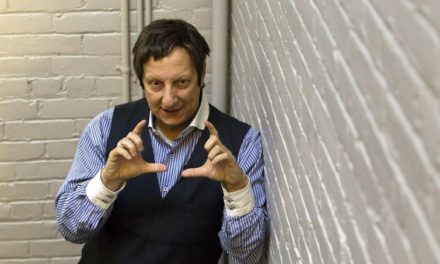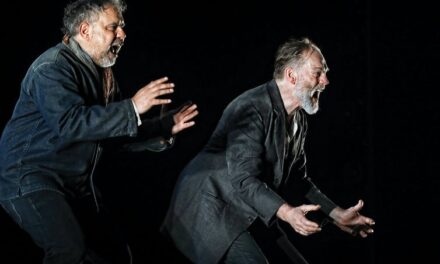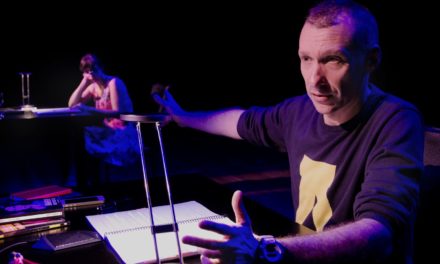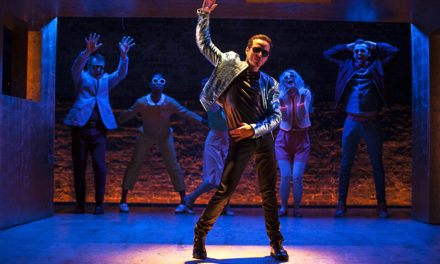The new play Insulted. Belarus(sia) was written in September 2020 by Andrei Kureichik, a prominent Belarusian playwright and member of the Coordination Council of Belarus, about the first month of the ongoing Belarusian revolution. Since the play’s inception, dozens of theatre companies, groups, and academic departments have produced virtual stage readings of Insulted. Belarus(sia), and many more are currently in the works worldwide. All characters in the play have real-life prototypes, representing polar points of view in the awakened Belarusian society. Some are recognizable as former and current leaders of the country, others as brave Belarusians who battle the totalitarian machine, sometimes at the cost of their lives, their freedom, and their loved ones. Kureichik explores how the Belarusian revolution differs from Prague in 1968, Russia in 1991, and Ukraine in 2014. In a raw and unapologetic way, the play addresses tragic escalations of violence and repression employed by the authorities, and how solidarity, truth, and faith in human values inevitably lead to victory over evil.
On October 7th, 2020 a small group of graduate students at the Department of Slavic Languages and Literatures at Harvard University participated in a live zoom reading of Insulted. Belarus(sia). During the post-show discussion, both the playwright Andrei Kureichik and the translator John Freedman shared their thoughts on the play’s vital role in capturing and understanding the ongoing fight against oppressive and corrupt systems of power.
The transcript has been edited and condensed for clarity.
Andrei Kureichik:
For 18 years in playwriting, I never thought I would write a play like this. Usually, I focused on more entertaining content. But very compelling events happened [recently] in my country, Belarus, and I was in the middle, I cannot stand by, as a playwright and a citizen. I decided to write my fresh feelings and verbatim information about the events, in particular about what happened during the terrible night of August 9th, the day of elections. I decided to make the people [into characters] who were really involved and had an impact on what was and still is going on in Belarus. Some of them are known in the world, some only in Belarus. But I should say it was very important to write this play right then, during the events. To me as a playwright, it should not be a cold view, it should be the hot view. I started this play two and a half weeks after the elections and finished on the 12th of September. When it was finished, I sent it to John without any idea (agenda?). then, some miracle happened. I never thought that the solidarity of people, not only friends, would be so wide and incredibly fast.
John Freedman:
I’ve been following Andrei on Facebook, we have exchanged some letters, comments. And then all of a sudden, I got a message with the play, along with an inquiry about arranging readings in the West. I thought it was a good idea. I sent out letters to six good friends, directors, and actors, and in ten minutes they all responded saying they wanted to do it. I started translating and did it in three days. It was a sloppy, almost literal translation. I knew that over the course of the readings people would make comments and things would happen. Then Jenya Mironava [graduate student at the Department of Slavic Languages and Literatures at Harvard University ] agreed to take in the script and help me with the Belarusian parts. I am forever indebted to Jenya! From six theatres in a day, it went to ten or twelve and then to twenty, and then it took on a life of its own, and we now have sixteen countries and fifty-seven events, and there are several more joining us soon. It is pretty astonishing. I think there are several reasons for it: first, this revolution in Belarus is a terrible and beautiful thing. As a topic, it is extremely attractive. Secondly, Andrei Kureichik wrote a brilliant play. This is a play which will go into history as one of the great Slavic plays, a national treasure of Belarus. I guarantee it. in fact, it’s already happened. The brilliance of this play is the way he takes us in so lightly, doesn’t help us out at all, doesn’t tell us who we are listening to, who is talking. We don’t understand that the characters are connected. And then, as the waves of the plays go on, people start connecting, until you get how everybody is connected in the end. He did that so easily and beautifully.
Andrei did a beautiful job of bringing out all seven characters. The seven characters are very distinct, unique, we understand all of them to the extent that we can understand people, and that’s of course is another reason why this play is getting such a response.
AK: The play is in Russian because my prototypes speak mostly Russian, with some dialects.
JF: I made no attempt to show the mix of languages in the translation. If I tried to make a mix, it would have taken us down to a rocky road. There is nothing that can be done in English that can approximate the closeness of Russian and Belorussian languages. Andrei and I briefly discussed it, and he said not to worry about the words, but to translate what the play is about.
AK: It is not just the story of events, but the story of emotions. To understand the revolution, you should understand the emotions of people who are involved from all sides. Dramaturgy, real playwriting is working with the emotions of your heroes, and your own emotions as a playwright. Theatre is the best form to involve audiences in these situations. I am pretty sure that a lot of people read the news on websites or see it on TV. But you never know what you understand really if you don’t understand what emotionally happens with a country. The play is about this.
This post was written by the author in their personal capacity.The opinions expressed in this article are the author’s own and do not reflect the view of The Theatre Times, their staff or collaborators.
This post was written by Irina Yakubovskaya.
The views expressed here belong to the author and do not necessarily reflect our views and opinions.


















